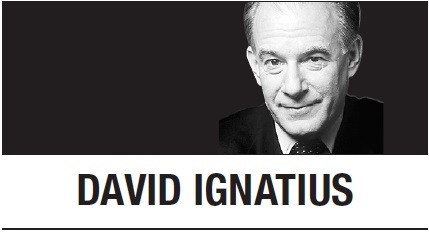[David Ignatius] Populists and traditionalists are battling in both parties
By David IgnatiusPublished : March 14, 2019 - 17:02
 Dick Cheney, the former vice president, made just about the nastiest crack a Republican could offer about President Trump’s foreign policy when he said it “looks a lot more like Barack Obama than Ronald Reagan.”
Dick Cheney, the former vice president, made just about the nastiest crack a Republican could offer about President Trump’s foreign policy when he said it “looks a lot more like Barack Obama than Ronald Reagan.” Obviously, the comparison is flawed. But say this much for Cheney: He’s the rare Republican who isn’t intimidated by Trump these days. Cheney made a string of similarly blistering comments at a supposedly off-the-record conversation with Vice President Pence at a gathering in Sea Island, Georgia, last weekend hosted by the American Enterprise Institute.
Cheney’s remarks tell us that we are experiencing what may be a political realignment in America, in which some of our political labels don‘t work very well. There’s a populist wing in both parties, with Trump and some progressive Democrats expressing broadly similar concerns about America’s overextension in the world and the unfairness of the existing global order to working people.
There’s a traditionalist wing in both parties, too, which supports the old Cheney-esque American-led world order and its network of alliances and trade agreements. This traditionalist approach was embodied in the shared invitation this week by Democratic House Speaker Nancy Pelosi and Republican Senate Majority Leader Mitch McConnell to NATO’s secretary-general, Jens Stoltenberg, to address a joint session of Congress.
There’s a world of difference, to be sure, between Trump’s bullying, rich-guy version of populism and Vermont Sen. Bernie Sanders’ empathetic, progressive version. Similarly, Pelosi‘s version of internationalism is less defense-oriented and hawkish than McConnell’s. But politics is confusing these days partly because the usual left-right spectrum doesn’t always apply. Is free trade liberal or conservative? How about internationalism? What about privacy protection?
American politics has always been more personality-driven than ideological, and when we think of eras, they’re usually defined by presidents. George Washington personified the Federalist Era; Andrew Jackson defined a freewheeling Democratic Party assault on the elites; Abraham Lincoln created the modern Republican Party in the Civil War; and Theodore Roosevelt recast it in the Progressive Era; Franklin Roosevelt created a new Democratic coalition; and Reagan framed a new Republican one.
Is Trump such a transitional figure? I doubt it. He seems more an emblem of our current political disorder than the architect of a new political alignment. But he’s a harbinger of change in our party system.
Trump already has led one of the most successful insurgencies in American politics. He destroyed the existing Republican establishment, savaging the GOP’s field of presidential candidates in 2016. His defiant, carnival-barker politics of resentment was on display this month at the CPAC convention. It was a bizarre, idiosyncratic performance, but it clearly enthralled his audience. Trump owns what’s left of the party he wrecked.
Democrats these days can seem just as frightened as Republicans by a party base that’s in ferment. An example is former Colorado Gov. John Hickenlooper, an ex-entrepreneur who created a bipartisan base in his home state. Hickenlooper is the embodiment of a moderate Democrat. But he verged on incoherence last week on MSNBC’s “Morning Joe” when host Joe Scarborough asked him if he was a “socialist” or “capitalist.” Watching him, it seemed possible that Democrats are as jittery about offending Sanders supporters as Republicans are of crossing Trump.
Maybe Sanders has the passion and progressive appeal to make “democratic socialism” a winning strategy for 2020. He’s undeniably appealing to the Democratic base; polls show him gaining steadily over the past two months, while most of the rest of the field has been treading water.
But I’ll be very surprised if Sanders can make it to the White House. The Democrat who can beat Trump is more likely to be a large but also reassuring personality, acceptable to blue-collar Democrats and also exciting to younger voters -- a more youthful version of Joe Biden, perhaps. People who occupy that space (at least on my mental map) include Sen. Michael Bennett; Sen. Kamala Harris, Sen. Amy Klobuchar, Rep. Seth Moulton and former Rep. Beto O’Rourke.
Political systems can be like scientific theories. Sometimes there emerge so many anomalous elements that don’t fit the existing structure that the theory collapses, and a new one arises. In science, that means, for example, that the theory that the sun revolves around the earth loses its explanatory power, and evidence proves the opposite is the case. In politics, new parties emerge, or the existing ones develop new identities.
We may be entering such a period. The definition of a winning Democrat may be that, in response to Trump’s rambling circus of self-aggrandizement, he or she could create a genuinely coherent new political order.
David Ignatius
David Ignatius’ email address is davidignatius@washpost.com -- Ed.
(Washington Post Writers Group)








![[Kim Seong-kon] Democracy and the future of South Korea](http://res.heraldm.com/phpwas/restmb_idxmake.php?idx=644&simg=/content/image/2024/04/16/20240416050802_0.jpg&u=)







![[KH Explains] Hyundai's full hybrid edge to pay off amid slow transition to pure EVs](http://res.heraldm.com/phpwas/restmb_idxmake.php?idx=652&simg=/content/image/2024/04/18/20240418050645_0.jpg&u=20240418181020)

![[Today’s K-pop] Zico drops snippet of collaboration with Jennie](http://res.heraldm.com/phpwas/restmb_idxmake.php?idx=642&simg=/content/image/2024/04/18/20240418050702_0.jpg&u=)